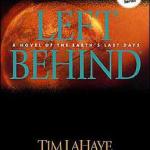Left Behind, pp. 228-231
Chloe Steele got up and walked out during the middle of the meeting for "the disenchanted and the skeptics" at New Hope Village Church.
"Do you wonder why I walked out?" Chloe asks. And, yes. Yes I do.
"I figured it was because the questions and answers were hitting a little too close to home," Rayford says, and I wish he hadn't because it only reminds me that LaHaye and Jenkins frustratingly chose to omit that crucial scene, leaving us readers in the dark about what all those "too close to home" questions and answers might have been.
"Maybe they were, but all this stuff about Satan and the Fall and sin and all that …" She stopped and shook her head.
Those ellipses are again frustrating because we didn't get to hear what exactly the Rev. Bruce Barnes said about "all this stuff." One wonders what it was he said in presenting the Christian gospel to the assembled crowd of skeptics. "The Fall and sin and all that" would certainly play some part in such a discussion, although it shouldn't be the only, or the main, point. And Satan really doesn't need to have a starring role in such a talk, so it's strange that Chloe should come away with that impression. I'd guess either that Bruce was engaging in more vicious regress theodicy (it's Satan's fault), or something worse, like perhaps the unfortunately common error that Christ was crucified to give the Devil his due, but again we'll never know because the authors skipped that scene.
The discussion that follows is one of the more realistic bits of dialogue in the book so far. It captures a conversation that frequently occurs between would-be evangelists and their reluctant counterparts. You may recognize this conversation as one you have participated in from one side or the other:
"I know I'm a sinner and that this world is full of them," [Rayford said].
"And you consider me one."
"If you're part of everybody, then, yes, I do. Don't you?"
"Not on purpose."
"You're never selfish, greedy, jealous, petty, spiteful?"
"I try not to be, at least not at anyone else's expense."
"But you think you're exempt from what the Bible says about everybody being a sinner, about there not being one righteous person anywhere, 'No not one'?"
"I don't know, Daddy, I just have no idea."
It's a bit odd that Rayford, who fell asleep before reading Acts and the epistles, is suddenly able to recite a passage from Romans 3/Psalm 14 from memory, but let that pass. He is, for once, fairly accurately conveying something that Christians actually believe: "There is no one righteous, not even one" (Rom. 3:10). We believe, in other words, that the need for forgiveness is an essential, universal part of what it means to be human. And we believe this is true even for those who may not feel or be aware of this need. Those who disagree may, understandably, find this offensive — a kind of passing judgment or, perhaps, a bit of projection, like when your newly sober friend, three months into AA, gives you that knowing smirk after you mention going to a bar, suggesting that you're just in denial about your own alcoholism. I don't want to engage in such projection, so if you disagree with this Christian contention — if you believe that the need for forgiveness is not, in fact, a universal human trait — then I'd simply ask that, rather than taking offense, you take pity. I need forgiveness, so even if you don't believe I need God's, I hope you'll grant me yours.
I've often described evangelism, properly understood, as a form of hospitality — Come on in and take a load off. Hospitality invites and offers; it does not dictate. "Have some tea?" not "[You must] have some tea [or else]."
One of my favorite descriptions of such hospitable evangelism is "one beggar telling another beggar where I found bread." A perfectly legitimate response to such an offer is to say, "Thanks, but I'm not a beggar and I'm not hungry." A hospitable evangelist will not force the issue, as Rayford does here, insisting that yes, in fact, you are a beggar and you are hungry, you just don't know it yet. Nor would such an evangelist take the next step that Rayford takes, trying to prove his point by citing scripture, as though this should settle the matter with someone who has no reason to regard what it may or may not say as in any way authoritative.
One of the things I admire about Billy Graham is his willingness to, like Jesus, extend an invitation to "all who are weary and burdened," without harassing those who may respond, "Thanks, but I'm not." Fair enough, Dr. Graham says, we'll be here if you change your mind.
The alternative to such hospitality is to take the approach that Rayford takes above, insisting to Chloe that you do so need forgiveness, you "selfish, greedy, jealous, petty, spiteful" sinner (talk about projection). I appreciate that many of my coreligionists regard this as a legitimate approach. Rather than getting bogged down here in a discussion of why I find this tack immoral, let me just say for now that it's not particularly wise. "Trust me, you're a filthy sinner," is not the most winsome or promising form of evangelism (and you'd be hard pressed, apart from satires like Jonah, to find biblical models for such an approach).
After this brief flirtation with something Christians actually do believe, Rayford gets back to the main point of Left Behind — the peculiar, heretical eschatology that distorts all of its purported Christianity:
"What did you think of the video? Did it make sense to you?"
"It made a lot of sense if you buy into all that. I mean, you have to start with that as a foundation. Then it all works neatly. But if you're not sure about God and the Bible and sin and heaven and hell, then you're still wondering what happened and why."
Here we see, explicitly, why Bruce Barnes' use of the word "disenchanted" was telling, if not quite precise. What Bruce really meant was "un-enchanted," an apt description of all those skeptics who do not "buy into all that" premillennial dispensationalist foundation.
Chloe seems to be saying here only what every religious believer of any kind would claim: That their beliefs are internally consistent — that they are reasonable conclusions based upon premises taken on faith, and thus, while they may not be proveable, neither can they be disproved. (Here again I would borrow a distinction made by Wendell Berry: religion involves belief in that which cannot be proved; superstition involves belief in that which can be disproved.)
But the foundation, the premise, for the scheme laid on in the ICR video has very little to do with "God and the Bible and sin and heaven and hell." It has to do, rather, with a very strange method of de-coding the Bible and reinterpreting what it has to say about God and all the rest. It has to do with the rapture, the Antichrist, and a long checklist of supposed prophecies cobbled together arbitrarily from a long series of biblical passages ripped from their clearer contexts. If you buy into all that, if you start with that as a foundation, only then does the In Case of Rapture video or anything else in this book make any sense at all.
The problem with this system — or one of many problems — is that it is not internally consistent. It requires adherents to read particular passages in a particular way while simultaneously avoiding and ignoring other passages in such a way that it becomes nearly impossible to discern a coherent hermeneutic, a reasonable set of principles governing why Passage X should be decoded one way while Passage Y and Passage W are not. It does not begin with a set of premises taken on faith and proceed from these to reasonable, consistent conclusions. Instead, it asserts a set of arbitrary conclusions and then works backward to invent or discover the alleged premises.
Accepting this scheme, then, is not really like what Chloe describes. It is not a matter of accepting on faith premises about "God and the Bible … and all that" and then basing reasonable conclusions on that foundation. It is more like what Bruce calls it, a kind of enchantment. Accepting it has little to do with reason or with faith, but rather with a kind of magical thinking.
















